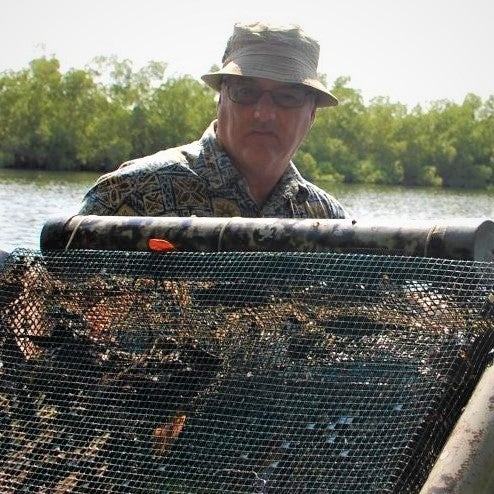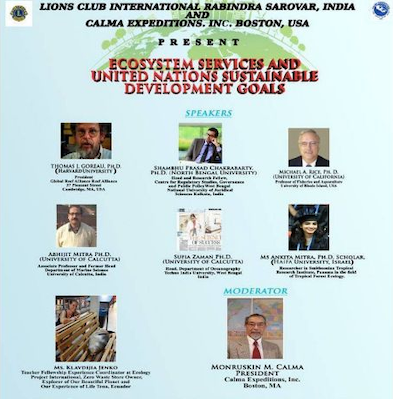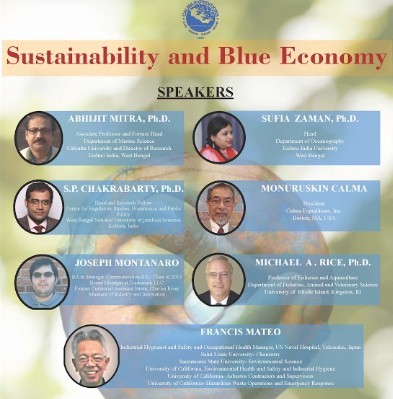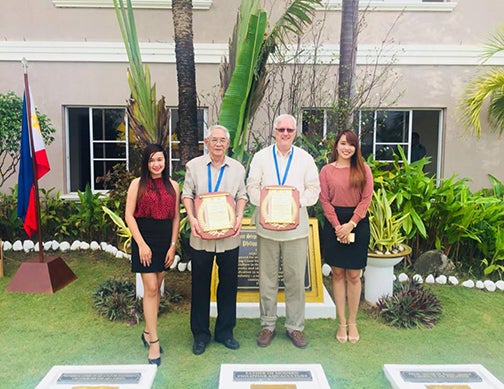
Aquaculture is a form of agriculture in which marine and freshwater fish, shellfish, algae and aquatic plants are the farmed crop. Since aquaculture statistics for the State of Rhode Island have began to kept by the Rhode Island Coastal Resources Management Council, since 1995, growth of aquaculture production in Rhode Island has averaged about 18% per year, making it one of the fastest growing industries in the state, and a contributor to Rhode Island’s growing local food economy. The URI Aquaculture Extension Program provides the most current science-based information in sustainable and profitable aquacultural crop production practices to growers through site visits, periodic publications, workshops and more. The program is formally linked to the Northeastern Aquaculture Extension Network through the Northeastern Regional Aquaculture Center, a program of USDA-NIFA.
Dr. Rice has recently received recognition from the Government of the Philippines, the Society of Aquaculture Engineers of the Philippines, and the Philippine Aquaculture Society in recognition of his lifetime contributions to International Aquaculture Extension.
Resources For Growers
Aquaculture Diet Evaluation
A fact sheet produced by the Northeastern Regional Aquaculture Center outlining methods for the evaluation of the quality of feeds for adult and larval fish.
Archive of the Shellfish Corner
An archive of articles from Dr. Rice’s column “The Shellfish Corner” in Aquaculture Magazine. This archive has has several short articles on a variety of topics of interest to the commercial aquaculturist.
Environmental ffects of Shellfish
A publication about potential environmental effects and social issues regarding the expansion of shellfish aquaculture production in the Northeast United States.
Freshwater Aquaculture
Information regarding the permitting procedure for freshwater aquaculture through the Coastal Resources Management Council (CRMC), permitting that requires the Rhode Island Pollutant Discharge Elimination System (RIPDES), legal protections and privileges of freshwater aquaculturists, and case studies representing freshwater aquaculture operations of the past vs. current regulations.
Total Organic Carbon (toc)
Total organic carbon (TOC) in the sediments in and around oyster farms in Rhode Island’s coastal lagoons and in Narragansett Bay was studied between June and August, 2019. The data from all individual 12 oyster farm sites show that there is no buildup of carbon-rich biodeposits attributable to the farms themselves. The magnitude of the background winter-summer carbon fluctuation in sediments on a temporal basis is much greater than the spatial differences in sediment carbon within and near all 12 oyster farms and their adjacent control sites.
International Programming and Webinars
Global dimensions of sustainable aquaculture are explored through a series of reports and webinar presentations by members of URI Cooperative Extension faculty and staff. Our international Cooperative Extension efforts in the Ocean State build upon our seafaring heritage by building learning and sharing partnerships across the globe in countries such as India, the Philippines, Indonesia, Gambia, Bangladesh,Tanzania, Republic of Georgia, and Zambia.
Aquaculture Management Guide
A manual providing strategies to prevent and address production hazards in the Northeast United States aquaculture. It also includes information regarding environmental monitoring, evaluation and sampling of stocks, record-keeping procedures and state-by-state contact information.
Barriers to Entry
There is a variety of freshwater and marine species produced in aquaculture operations in the Northeastern United States. However, upon research in this project, aquaculture regulations and resources for current and potential aquaculture producers vary greatly among states in the region. The key species, regulations, and resources have been identified for each state in the tables below. In addition, there are barriers to those interested in entering the aquaculture identified in each state. Some states have higher barriers to entry than other states.
Rhode Island Lobster Aquaculture History
The history of lobster aquaculture in Rhode Island, which began in order to replenish the lobster fishery in Narragansett Bay. The project lead to findings in lobster behavior and biology, and demonstrated the aquaculture feasibility that lobsters could be reared from eggs to adulthood.
Transient gear Aquaculture
Transient gear aquaculture is a method of farming oysters or other shellfish in a method that mimics the methods that are used by lobster fishers who put out wire mesh traps in ‘trawl sets’ in coastal waters. However, restrictions on the legal definitions of ‘aquaculture gear’ and ‘fishing gear’ has prevented the commercial adoption of the transient gear method. Within this publication is a pro-forma economic model (gear costs vs oyster production and sales) for oyster production using transient gear. This model that can used by aquaculturists using rack and bag or similar methods for farming bivalves to develop their own pro-forma financial statements.
International Programing and Webinars
Global dimensions of sustainable aquaculture are explored through a series of reports and webinar presentations by members of URI Cooperative Extension faculty and staff. Our international Cooperative Extension efforts in the Ocean State build upon our seafaring heritage by building learning and sharing partnerships across the globe in countries such as India, the Philippines, Indonesia, Gambia, Bangladesh,Tanzania, Republic of Georgia, and Zambia.
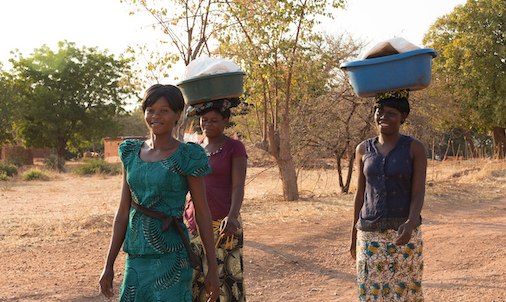
Population Ecology and Market Potential of introduced crayfish in Zambia — May 2021
Dr. Rice is leading a new international extension project in Zambia in southern Africa focusing on the management of two invasive crayfish species native to Australia. The project will investigate the population biology of the crayfish in Zambia waters relevant to management of the stocks and analyze the economic value of the potential crayfish market chain. The crayfish have potential to provide an alternative food, employment, and income source, thus contributing to poverty reduction among local Zambians.
Read the full article
